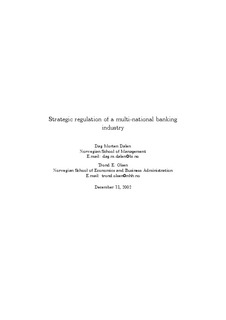Strategic regulation of a multi-national banking industry
Working paper
Permanent lenke
http://hdl.handle.net/11250/163647Utgivelsesdato
2002-12Metadata
Vis full innførselSamlinger
- Discussion papers (FOR) [566]
Sammendrag
This paper focuses on the consequences of cross-border banking and entry of multi-national bank (MNB) subsidiaries for banking supervision and regulation. When a MNB expands internationally with subsidiaries, the MNB operates under the legislation of several countries - both the home country and the host countries. Although these countries have agreed upon minimum standards and supervisory principles, such as in the EU directives or the Basle Accords, substantial degrees of freedom are still left to the national regulators. An interesting and important issue is whether the decentralized approach to regulation of MNBs creates inefficiencies and financial instability. Host country regulation of MNB subsidiaries creates cross-border externalities, where the supervisors and regulators in one country will be concerned with the standards in the home country and in other host countries. Our main result is that lack of international coordination of banking regulation works to lower capital adequacy requirements. In equilibrium, however, regulators respond by increasing the incentives to improve asset quality, making the probability of banking failure insensitive to the decentralized nature of banking regulation. Ownership of the MNB is shown to be of importance for the outcome of strategic banking regulation.
Utgiver
Norwegian School of Economics and Business Administration. Department of Finance and Management ScienceSerie
Discussion paper2002:30
